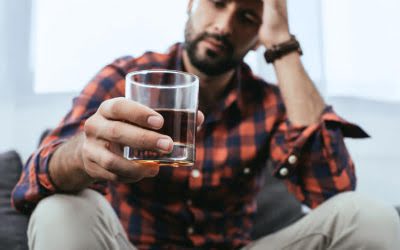Recovery from AUD is marked by stages of abstinence, withdrawal, repair, and growth. While the process may take several years, the outcome is a happier, healthier life where you have the freedom to fulfill your full potential. Your body has acclimated to quitting drinking over the past couple of years.
Although currently few treatments are available for tackling this significant health problem and providing relief for those suffering from the disease, there is hope. Although patients often are successful in learning cognitive–behavioral strategies in treatment, relapse rates remain high (Brandon et al. 2007; Sinha 2011). Another study examined stress-induced and drug-related craving and physiological responses using individualized scripts of comparable length and style for stress, https://ecosoberhouse.com/ drug- related, and neutral- related situations. Among cocaine-dependent individuals, the imagery exposure to stress and nonstress drug cues resulted in significant increases in heart rate, salivary cortisol levels, drug craving, and subjective anxiety, compared with neutral-relaxing cues (Sinha et al. 2000). In addition, mild to moderate levels of physiological arousal and subjective levels of distress were found to accompany the alcohol/drug craving state (Sinha 2009).
Chronic Alcohol-Related Changes in Emotion, Stress, and Motivational Systems
In the same 2018 NSDUH mentioned above, 9.2 million men and 5.3 million women reported having alcohol use disorder, but only 7.9% of them had sought treatment. 401,000 children between 12 and 17 also reported alcohol use disorder, with a measly 5% receiving treatment. To avoid relapse after a slip, many people attend support group meetings or therapy sessions. Alcohol Relapse Preventing relapse is one of the core issues in the treatment of alcoholism. Since remission is the underlying goal of disease treatment, clinicians remain concerned about the high rate of relapse. While the tips above can be helpful in minimizing the risk of a relapse, know that if it does happen, it doesn’t have to completely derail your recovery.
- While the abstinence stage of withdrawal causes mostly physical symptoms, post-acute withdrawal is very psychological and emotional.
- For instance, you might switch from hard alcohol to beer with lower alcohol content or maybe reduce your drinking from six days a week to two.
- Or, consider joining a club or meetup group based on your favorite activities in order to meet new friends and feel more connected to the community.
- You may need a different approach to treatment, or perhaps to return to inpatient treatment.
But know that you’re not alone; relapse may occur once or several times following treatment. When they do occur, additional treatment measures should be considered. You may also put yourself under another kind of harm-reductive model when working toward sobriety by reducing severity or frequency of use. For instance, you might switch from hard alcohol to beer with lower alcohol content or maybe reduce your drinking from six days a week to two. While they may seem like two simple and very similar words, there is a significant difference between being sober and being in recovery.
What to Do When You Relapse on Alcohol
For some, relapse is viewed in a negative light and indicates weakness. But this view is considered harmful since it fosters feelings of guilt and shame that can hinder your ability to recover from a setback. For others, recovery is a personal growth process that usually involves a couple setbacks.2 Rather than viewing a relapse as shameful, this perspective looks at it as a learning experience.

This suggests that the reinforcing value of alcohol may be enhanced as a result of experiencing repeated opportunities to respond for access to alcohol in the context of withdrawal. Finally, a history of multiple withdrawal experiences can exacerbate cognitive deficits and disruption of sleep during withdrawal (Borlikova et al. 2006; Stephens et al. 2005; Veatch 2006). Taken together, these results indicate that chronic alcohol exposure involving repeated withdrawal experiences exacerbates withdrawal symptoms that significantly contribute to a negative emotional state, which consequently renders dependent subjects more vulnerable to relapse. More recently, however, researchers have been turning their attention to the evaluation of changes in withdrawal symptoms that extend beyond physical signs of withdrawal—that is, to those symptoms that fall within the domain of psychological distress and dysphoria. This new focus is clinically relevant because these symptoms (e.g., anxiety, negative affect, and altered reward set point) may serve as potent instigators driving motivation to drink (Koob and Le Moal 2008). Sensitization resulting from repeated withdrawal cycles and leading to both more severe and more persistent symptoms therefore may constitute a significant motivational factor that underlies increased risk for relapse (Becker 1998, 1999).
Mitch’s Story of Overcoming Chronic Relapses
A lapse is when the person has a short slip from sobriety back into alcohol but is able to rapidly self-correct. Treatment is almost always necessary for navigating the complex path from addiction to alcohol to recovery, but addiction is a disease and can never be truly cured. They may stop taking care of themselves or start making excuses for their problems.
Most, if not all, people who have relapsed will say that during each relapse they learn something about themselves. Each time you come back to active recovery, you implement what you have learned to continue on your recovery journey. 2 Kindling is a phenomenon in which a weak electrical Alcohol Relapse or chemical stimulus, which initially causes no overt behavioral responses, results in the appearance of behavioral effects, such as seizures, when it is administered repeatedly. If you find yourself in an emotional relapse, try to learn more about how you can practice self-care.
Fortunately, with treatment, you can end your addiction to alcohol and live a high quality of life in recovery. When it comes to battling addiction, expert treatment from our professionals is only a phone call away. Here at Landmark Recovery, we have plenty of experience helping individuals and families through the pain of addiction and relapse. We are standing by to help you and your loved ones over this bump and get you back on the road to recovery and sobriety.
- This new focus is clinically relevant because these symptoms (e.g., anxiety, negative affect, and altered reward set point) may serve as potent instigators driving motivation to drink (Koob and Le Moal 2008).
- You stop attending all meetings with counselors and your support groups and discontinue any pharmacotherapy treatments.
- This effect apparently was specific to alcohol because repeated chronic alcohol exposure and withdrawal experience did not produce alterations in the animals’ consumption of a sugar solution (Becker and Lopez 2004).
- By Buddy T
Buddy T is a writer and founding member of the Online Al-Anon Outreach Committee with decades of experience writing about alcoholism.
- This includes all drugs, even ones that can help with substance or alcohol misuse, such as Vivitrol.
- You can take steps to get back on track after an alcoholic relapse has occurred, and you can watch for warning signs that you might need more intensive intervention.
